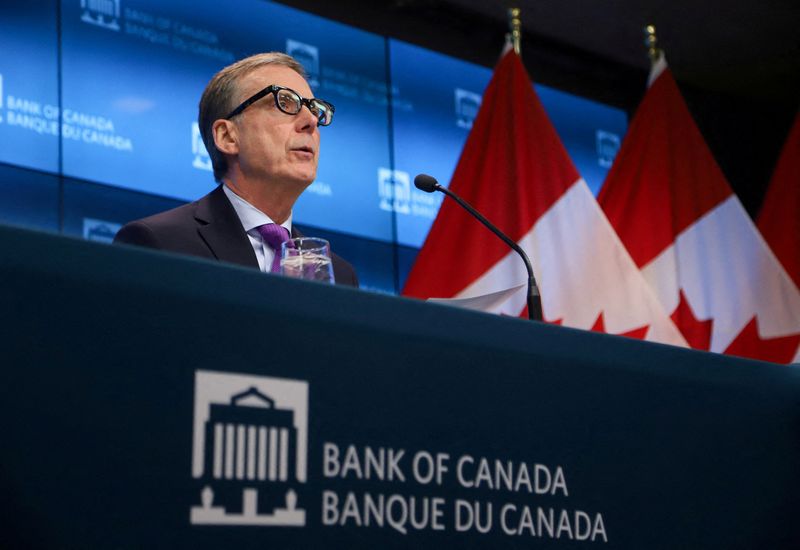By Steve Scherer and Promit Mukherjee
OTTAWA (Reuters) -The Bank of Canada (BoC) held its key overnight rate at 5% on Wednesday and said that while underlying inflation was still a concern, the bank's focus is shifting to when to cut borrowing costs rather than whether to hike again.
The BoC governing council has held rates steady at four consecutive policy meetings after last hiking in July. Annual inflation in December accelerated to 3.4%, still higher than the central bank's 2% target but below a June 2022 peak of 8.1%.
"Governing Council's discussion of monetary policy is shifting from whether our policy rate is restrictive enough to restore price stability, to how long it needs to stay at the current level," Governor Tiff Macklem said in remarks.
Later, Macklem told reporters: "It is premature to discuss reducing our policy rate."
"The Bank of Canada isn't ready, willing or able to bring interest rate relief just yet, but dangled some hints that lower rates are on the way later this year," said Avery Shenfeld, chief economist at CIBC Capital Markets.
Canadian money markets continued to fully discount a first, 25-basis-point cut in June.
The Canadian dollar weakened 0.1% to 1.3475 per U.S. dollar, or 74.21 U.S. cents.
The BoC dropped language included in previous policy statements saying it was "prepared to raise the policy rate further if needed." However, in his opening remarks to reporters, Macklem said that the bank had not ruled out further rate hikes.
"If new developments push inflation higher, we may still need to raise rates," Macklem said. "If the economy evolves broadly in line with the projection we published today, I expect future discussions will be about how long we maintain the policy rate at 5%," he said.
Macklem had previously indicated that rates were most likely at their peak but Wednesday's remarks were the first time he brought up the potential timing of a cut.
"(BoC governors) remain concerned about the persistence of underlying inflation," said Andrew Kelvin, chief Canada strategist at TD Securities. "While they are almost certainly done with rate hikes, they are not looking for near-term rate cuts until we see further progress on the inflation front."
A Reuters poll of 34 economists published last week forecast that the BoC would hold rates on Wednesday and at its next meeting in March. Twelve analysts said the first rate cut since March 2020 would come in April, while about two-thirds expect one in June or later.
The BoC trimmed its outlook for growth and was slightly more optimistic about when inflation would come down to its 2% target, according to new forecasts also published on Wednesday.
The BoC sees weak growth in the first quarter but then picking up gradually. Inflation is projected to stay around 3% through the first half of 2024, easing to 2.5% in the second half, and returning to target sometime in 2025. In October, the BoC said it would hit its target by the end of 2025.
Shelter prices and food are keeping inflation high, and wages are still rising between 4% and 5%, Macklem said, adding that "further declines in inflation are likely to be gradual and uneven" and the BoC "is concerned about the persistence of underlying inflation."
Before easing rates, "we want to see inflationary pressures continue to ease and clear downward momentum in underlying inflation," Macklem said.
The BoC said that said it was continuing its quantitative tightening (QT), which aims to reduce the size of the bank's balance sheet after it purchased bonds in large scale to support the economy during the pandemic.

Asked whether the bank would end QT, as some economists are suggesting should happen to bring down overnight bank lending rates, Macklem said it was too soon.
"We're certainly not there yet," he said.